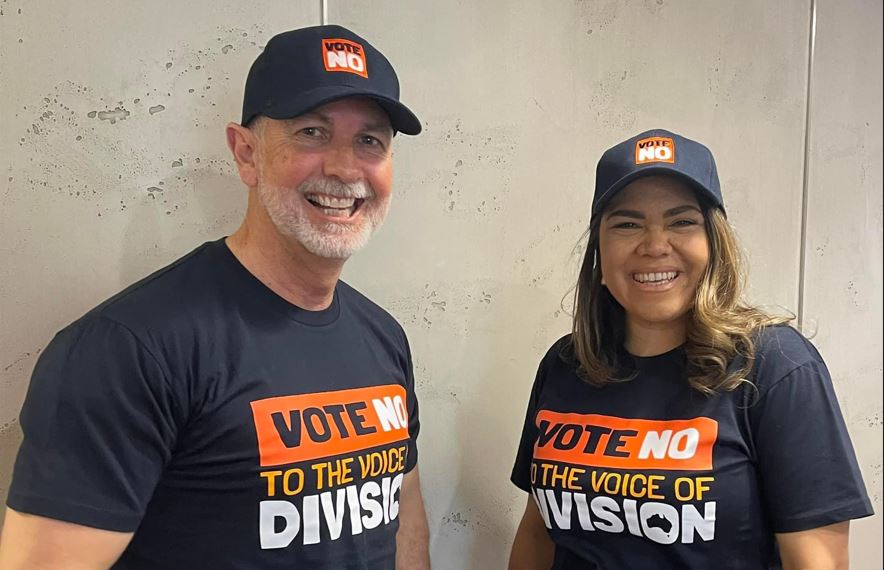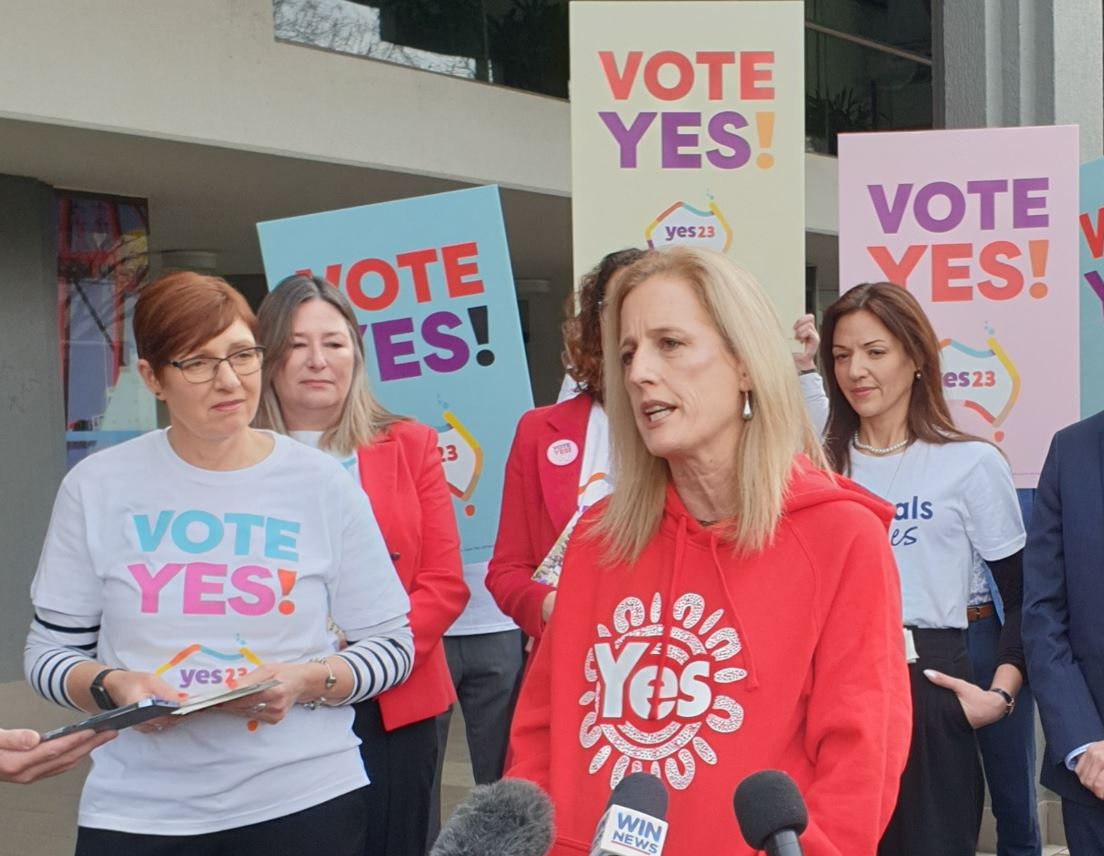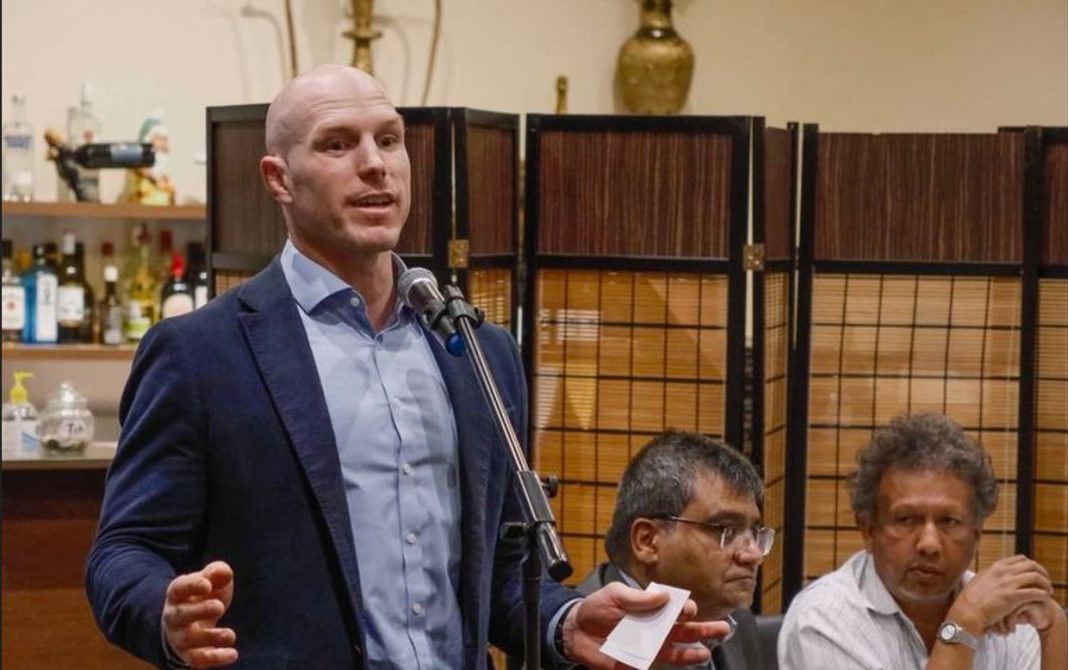Canberra Daily presents the first three opinion pieces in a series in which prominent Canberrans give their views on the Voice to Parliament. Forum Australia held a panel discussion on this important issue last week. Among those sharing their views were Independent Senator David Pocock, Canberra Liberals MLA Jeremy Hanson, and Labor Senator Katy Gallagher.
Senator David Pocock
ACT Independent Senator David Pocock supports the Voice to Parliament, which he believes is a “deeply practical” solution to disadvantage.
I love living in this part of Australia; I think it’s an incredible place – the rivers, the mountains, the grasslands. We really are lucky to live here, and I’d like to acknowledge the Ngunnawal people who have been looking after this part of the world for hundreds and hundreds of generations.
As an immigrant, my family moved here in 2002. I’ve fallen in love with this country. But I find it very hard to get my head around hundreds of generations living in one place, having that connection to a place and to the rivers and to the high country.
I might just give a small perspective on what’s been happening in Parliament around this. For me, the Voice is an incredibly generous offer from Australia’s First Peoples. After everything that has happened over the last two centuries, to say “We would like a way forward, we want both symbolic recognition” – and symbolism is important; I don’t think we should dismiss symbolism – “but we also want something that is deeply practical. We want to be able to give advice on issues that affect us.”
It’s a very simple request, and it really is about the principle. The Constitution is all about principle. There’s not much detail in there. You look at tax or defence; there’s nothing in the Constitution other than the federal government can levy taxes; the federal government can have a defence force.
So, we’re voting on the principle here, and I’m very concerned the way we’ve seen politicians try and use this for political gain rather than engaging on the issue. Because the politicians who are saying that we don’t have the detail, this is risky, know full well that they will be involved in all the detail and in legislating. That’s how it works in our democracy: we have the principle in the Constitution, and then we leave the detail up to the politicians. And if we don’t like the detail that they put together, we vote them out and we give someone else a go.
And so, I think it’s really important to remember that. When you see the politics that’s playing out, this is about the principle. Do we want to acknowledge this continent’s First Peoples? Do we want to allow them to have a say on issues that affect them?
And whilst things aren’t looking good in the polls, there’s still time left. There’s time left for Australia to say: Yes, we can be a generous country. We can move forward. We can say no to the fear mongering that we’ve seen.
And on a personal level, I think back on decisions that I’ve made. And if you allow fear to dictate the way you make decisions, you don’t make good decisions. And I think it’s the same with a big decision like this for us as a country. We need to have the courage to say yes. Let’s do something different. If it isn’t broken, then don’t fix it, but clearly, it’s broken. And that’s why we’ve got this referendum: to try and fix things.
This is not going to solve it overnight. This is a long-term project to slowly, but surely, address the entrenched disadvantage that we see. Every year they have the Closing the Gap report tabled in Parliament, and things aren’t improving.
So, I would urge people to have conversations. Who do we want to be as a country? Do we want to be a country that has a request from the continent’s First Peoples saying recognise us, give us a voice – and us say no? I really worry about what that means for us as a country.
So, we know that the thing that really can make a difference in these political decisions is conversations you have with friends, with family. I’d encourage you to have them over the next few weeks leading up to the referendum.
Jeremy Hanson MLA
Canberra Liberals MLA Jeremy Hanson, Deputy Leader of the Opposition and Shadow Minister for Education, Police and Veterans, voices his doubts about the Voice.

On principle, I believe we shouldn’t change the constitution to entrench any racially-based entity that treats one group of Australians differently to other Australians. As a nation, we have worked tirelessly to treat every individual equally, regardless of race, colour or creed.
Equality of citizenship is part of what it means to be Australian. I do not support something I consider to be taking Australia backwards by institutionalising racial division in our founding document.
We are all Australian, and each of us has a voice that represents all of us equally. It is the Australian Parliament.
There are currently 11 Indigenous Federal members, which proportionally outnumbers non-Indigenous parliamentarians. This is something I celebrate, and I fear entrenching a separate, unelected ‘Voice’ in the constitution would diminish the power of those elected members and the people they represent.
The solutions to the undeniable disadvantage faced by some, but certainly not all, Indigenous Australians are in my view not to be found by creating race-based constitutional division.
The ‘Voice’ is already creating division across Australia and in particular amongst Indigenous Australians. On Australia Day in Canberra, representatives of the Tent Embassy led protests against the Voice. Indigenous Senator Lidia Thorpe resigned as a member of the Greens because of her opposition to the Voice, and Senator Jacinta Nampijimpa Price from Alice Springs is also campaigning strongly against it.
Indigenous Australians in remote Australia have disputed the idea that their very diverse communities can be represented by a group of appointed people as a single voice.
This is not just a debate about the principle. This would be a deeply significant change to the Constitution, and the inclusion of ‘executive government’ in the Voice risks an ongoing legal quagmire of High Court challenges. Beyond its potential legal powers, the Voice will also wield significant political power. The Prime Minister has admitted that only a ‘very brave government’ would disagree with the Voice on certain policy issues. I believe that no group of unelected Australians should ever wield such legal and political power.
It also concerns me that the Prime Minister has refused to provide sufficient detail about the Voice. Any change to the Constitution is permanent and significant, and should not be made without a full understanding of what is being proposed.
It is disappointing in the extreme that the Prime Minister has proceeded with such a divisive referendum that has split Australia down the middle. If he had taken a proposition that was about recognition alone, it could have been a unifying moment for Australia. Whatever the result of the vote, Australia has now been divided as a result of this referendum, and that represents a monumental failure in leadership.
Senator Katy Gallagher
As a strong supporter of the Voice to Parliament’s Yes Campaign, Labor Senator Katy Gallagher believes the Voice will “make a practical difference to move our country forward”.

Voting yes for constitutional recognition through a Voice is about three things: recognition, listening, and better results.
It is our opportunity to recognise 65,000 years of history, culture, and tradition. And to start better listening to communities to make a practical difference to the lives of Aboriginal and Torres Strait Islander people.
The Voice will be an independent committee made up of Aboriginal and Torres Strait Islander people from every state and territory, the Torres Strait, and regional and remote communities.
The Voice is an idea that came from Aboriginal and Torres Strait Islander people – as expressed in the Uluru Statement from the Heart.
The Voice is about advice. Advice that will lead to better outcomes in health, education, jobs, and housing.
Because when governments listen to people on the ground, they make better decisions, get better results, and deliver better value for money.
This will unify Australia – and move our country forward, together. Voting yes is something we can all do to make a practical difference for Indigenous people today, and for the next generation.
Every conversation you have between now and Referendum Day matters – so talk to your friends, family, and colleagues about how a Yes vote on October 14 will bring our country together and change it for the better.
And if you want to be a part of the campaign, I would encourage you to head to the Yes23 website to find out how to get involved.
Forum Australia (Aussie Forum Inc.) was established in 2005, and has held more than 50 open fora discussing issues that concern all Australia. It is committed to provide a platform to all to “have your say”. Previous topics include harmony, higher education in Australia, carbon pricing, the environment, racial discrimination, Gen Y, accountability in Australian global aid, trust in politics, gender equality, the rise of the right in politics, Afghanistan, Canberra in 2030, and First Australians and their issues. Speakers have included Gary Humphries, Bob McMullin, Dr John Hewson, Jack Waterford, Professor Ian Chubb, and Virginia Haussegger. Forum Australia aims to increase awareness of current issues, and carry the views and aspirations of common Australians to ‘movers and shakers’ and politicians.



